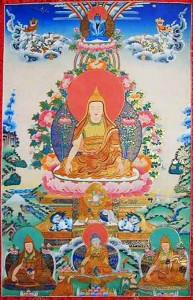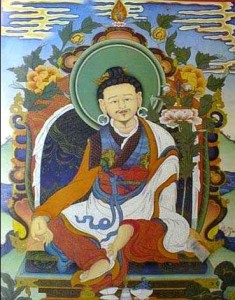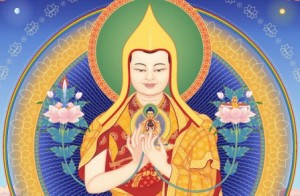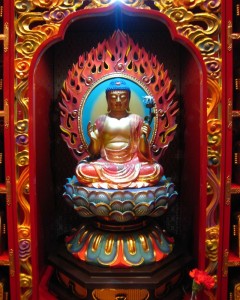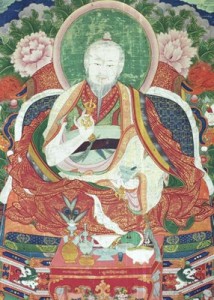
The following is respectfully taken from “Drops of Nectar” by Ngagyur Nyingma Institute:
Drops of the Nectar of Oral Instructions 1: Orgyen Terdag Lingpa
Om Svasti!
Relying upon him, one is completely protected from the many fears of worldly existence.
And established on the path of liberation.
I pay homage to the most kind Master, the Three Jewels Incarnate.
Understanding that he is the essence of my own wakeful awarness.
It is the responsibility of those who wish to attain liberation to follow the displine
Concerning what must be cultivated and what must be abandoned
In accordance with the Victorious One’s teachings, commentaries and instructions,
Thus, adopting this way of acting is appropriate.
The human body, adorned with freedoms and favorable conditions,
Is more extremely difficult to find and is of great importance.
At the time you have something like this, if you do not accomplish the ultimate aim
Who could be more stupid and deluded than that?
All composite things are impermanent and are certain to die.
The time of death is uncertain and the circumstances of death are limitless.
Since at the moment nothing but the sublime teachings will be of benefit,
Without procrastinating practice diligently.
The sufferings of the lower realms are unbearable like a pit of fire.
Sinking there once, how will you find the opportunity for liberation?
Even in the realms of happiness, suffering is actually experienced.
Therefore, you must conclusively establish the means of becoming free.
The seeds of constructive and destructive actions unfailingly
Ripen into the fruit of happiness and sorrow.
As this is the very nature of interdependence, you must rely on attentiveness and mindfulness
Concerning the manner of what to engage in and what to avoid.
From the bottom of your heart, pray to rest your hope permanently
In the unfailing protector, your Master, and the Three Jewels.
Cultivate the enlightened mind of Bodhicitta by offering your compassionate responsiveness
To your fathers and mothers, beings most kind, who are as pervasive as space.
From beginningless samsara until this moment,
Your mind has wandered continuously through ignorance and delusion.
From now on, with no attachment to deluded activity,
Make effort to realize the undeluded true nature of reality
Respectfully following a spiritual master who has all the defining characteristics,
By ripening your mind stream through receiving the perfectly pure four empowerments
Of the great mandala of Vajrayana
Establish yourself unmistakenly in profound interdependence.
As spiritual commitments themselves are the only root of accomplishment,
Without transgressing the boundary of prescribed precepts,
Knowing the restrictions and purposes, practice without confusion
The disciplines of adopting and abandoning according to the Three Vehicles.
The primordial reality and the nature of all phenomena
Is profound, tranquil, unelaborated, luminous and unconditioned.
Apply yourself in the methods of realizing exactly as it is
This vajra mind, perfected in its ground and unchanging.
The manifold appearances of mind, as many as there are,
From their mere appearance, are unreal as magical illusions.
Under the power of habitual tendencies towards singular phenomena,
The causes and conditions of attachment and hatred are
uncertain, and lack single identity.
If analyzed and investigated, it cannot be established as anything.
Yet everyting arises in the brilliant clear awarenss.
As the manifestations of mind are arising unceasingly
It is said that the appearances are themselves what is called mind.
The nature of mind is luminous, intangible and inconceivable.
Its expanse is free of mental constructs, and falls in no particular direction.
Vividly wakeful in the continuity of unconfined self-appearance.
Rest in the primordial purity that is changeless and perfect from the ground.
Binding the essential movements of body with the key points,
Let the movement of the breath in and out come to its natural state.
With no distraction from the focus of meditation on mind itself,
Focus the three doors in union on the essential practice.
Without attachment to the apparent yet empty form of the deities, the illusory bodies,
Engaging in recitation with indivisible wind and mantra train in the continuity
Of mind– luminous, uncompounded great bliss,
The path of method that purifies channels, energies and essential drops.
Through the yoga of the indestructible three vajras: body, speech and mind,
Cleanse the energy channels, dissolve the energies and thoroughly purify the essential drops.
Drawing on the interrelated enhancing pracitces of day and night.
You will experience the fruition of the natural state.
Clearly and without grasping, recognize your own nature by yourself
By the pair of calm abiding cultivated through resting in awareness
And the extraordinary insight of perceiving your nature nakedly.
Nurturing this without distraction is the essence of the path.
The view that understands emptiness is the natural state itself.
Cultivating undistracted mindfulness is the path of meditation.
For the yogi who trains in compassionate expressiveness
As diligently as possible, the foundation of liberation will be firmly laid.
Putting enormous effort into the meaningless activities of this life,
Many are left with only superficial practice toward the ultimate purpose.
Even with the intention to practice the Dharma, those who take it in hand are very rare.
Thus in short, concentrate on the holy dharma.
Persevere in the pure vision that knows with certainty the
Master to be your own awareness.
By arousing unbearable devotion and fierce respect,
You will be blessed to realize the self-arising primordial wisdom
And effortlessly conviction will develop from deep within.
Whatever unfavorable conditions of illness or malevolent influences may arise,
Through never finding their essential nature to be truly established
Except as manifestations of deluded ignorance,
Train yourself by taking adversities on to the path as the play of illusion.
Seek out different spiritual masters upholding their respective Dharma traditions.
According to the interests of those to be tamed, each is profound in its own manner.
In this way, without accumulating the evils of attachment and anger.
Genuinely train in pure vision, non-sectarianism and superior intention.
In a place of solitude, engaging in ordinary food and drink,
Being occupied with frivolous entertainment in attending to your retinue of disciples and patrons,
Endlessly engaged in deceiving people,
Do not be caught in samsara, deceiving yourself through confusion.
By becoming distracted into the many kinds of knowledge that appear to benefit others,
Methods of healing and astrological calculations,
Coming up with examples, and so on, ordinary thoughts build up, and
The images of a great many dharma practitioners are lost.
The natural disposition of the mind is to be self-aware and to rest in its own place;
The radiance of the mind is the unceasing arising of all manner of things.
Recognizing delusion’s own faults and the non-existence of the basis of delusion,
Study, contemplate, and train on the path of indivisibility.
In short, whatever arises, don’t construct thoughts about it;
Nurture it without fabrication, naturally, in its own radiance,
just as it is.
Whatever occurs, be it abiding or moving, do not obstruct or strive.
Always sustain the self-nature of your awareness without distraction.
When gazing directly at your mind,
From the instant of emergence, without defining it as ‘it is thus’
Strive to maintain with no distraction the original face
Of the natural state of your primordially self-liberated awareness.
You have the power to bear the meaningless hardships of this life
Yet for the sake of dharma you don’t give up a single session of sleep.
Be unmistaken in your choice of what to adopt and what to abandon;
Always strive to achieve the ultimate goal.
So be it. This copy is offered from the admonition of oral advice in the words of the King of Dharma, Orgyen Terdag Lingpa, which is known as the Drops of Nectar.



